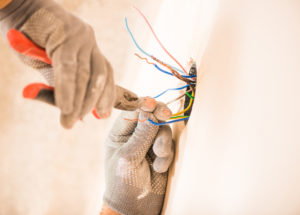What Causes Electrical Equipment To Overheat?

With overheating being one of the most common problems for electrical devices, knowing what causes electrical equipment to overheat — and the red flags of overheating — can help you protect your family, your home, and your electrical equipment.
What Causes Electrical Equipment To Overheat
There are three main causes of electrical overheating:
- Excessive current: This is the least likely cause of electrical overheating because circuit breakers and fuses typically safeguard against this.
- Poor connections: This factor can generate high wattage over a small area for a long period, which can trigger an electrical fire.
- Insulation breakdowns: As insulation wears down, sparks can be ejected, increasing the risks of electrical fires.
5 Signs an Electrical Device Is Overheating

- Smoke
- Frayed cords
- Discolored outlets
- Broken or cracked plugs
- Equipment that is warm or hot to the touch
In general, the electrical equipment in your home that is most susceptible to overheating includes major appliances that regularly draw current. This can include your HVAC system, refrigerator, washer and dryer, and more.
If you notice the signs of overheating with any of the electrical equipment in your home, contact an experienced electrician as soon as possible.
How To Prevent Electrical Equipment from Overheating
If you’re ready to address electrical safety in your home and minimize the risk that your equipment will overheat, here are four things you can do:
- Install GFCI (ground-fault circuit interrupter) outlets indoors wherever there is a potential water hazard, including in your kitchen and bathrooms.
- Dedicate separate circuits and outlets for large appliances, like your refrigerator, oven, dishwasher, washing machine, and dryer.
- Dispose of damaged or frayed electrical cords.
- Consider an electrical panel upgrade or wiring upgrades if your current system is outdated or unable to support your electrical needs.
- Get a safety inspection from an expert electrician at Lon Lockwood Electric to make sure you’re not at risk of an electrical fire.
To schedule an inspection or any electrical service, call (585) 766-4702 or contact Lon Lockwood Electric today.
